Astrophytum asterias
Astrophytum asterias is a species of cactus in the genus Astrophytum, and is native to small parts of Texas in the United States and Mexico. Common names include sand dollar cactus, sea urchin cactus, star cactus and star peyote.
| Astrophytum asterias | |
|---|---|
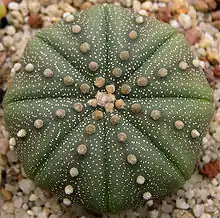 | |
| Scientific classification | |
| Kingdom: | Plantae |
| Clade: | Tracheophytes |
| Clade: | Angiosperms |
| Clade: | Eudicots |
| Order: | Caryophyllales |
| Family: | Cactaceae |
| Subfamily: | Cactoideae |
| Genus: | Astrophytum |
| Species: | A. asterias |
| Binomial name | |
| Astrophytum asterias | |
Description
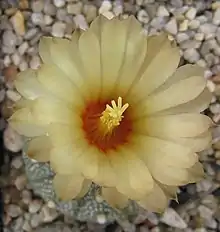
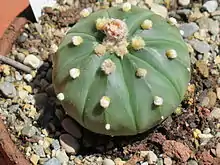
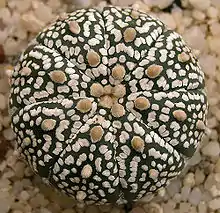
A. asterias (also known as the Star Cactus) is small, round, spineless and squat, reaching a height of 2.5–6 cm (0.98–2.36 in) and a diameter of 5–15 cm (2.0–5.9 in).[4] The disc-shaped body is divided into 7–10 sections, known as ribs; in the middle of each rib there are woolly areoles.[5] The body is a greenish-brown colour and may appear speckled from its covering of white scales (trichomes).[6] The flowers of this cactus are yellow with red bases and the outer parts are very woolly.[5] Green to pink oval fruits are produced; the outside coat is covered with woolly hairs.
Biology
Reproduction takes place via sexual outcrossing through cross-pollination; star cacti reach sexual maturity after a few years, when they have attained 2–3 centimetres (0.79–1.18 in) in diameter.[5] Flowers are produced from March to June (the summer season in its native habitat) and fruiting occurs from April to June. The primary pollinators of A. asterias are medium to large size bees with one species, Diadasia rinconis being the most effective.[7]
The plant also bears a superficially close resemblance to the unrelated Euphorbia obesa, which actually is not a cactus; simply put, all cactus are a succulent, and by their very nature they, themselves, are succulent (I.e., storing water for future droughts). But not every succulent is going to be a cactus.
Another key difference between cacti and Euphorbiaceae is origin and wild distribution. Cacti, including Astrophytum, are predominately found on the American continents, with a great variety in South America and Mexico. Though they are diverse, and widespread globally, the majority of Euphorbia succulents are found in Africa, the Middle East, and India. Furthermore, all members of Euphorbiaceae produce a potentially irritating, caustic latex sap that can cause blindness if eye contact is made. Cacti, by comparison, are mostly non-toxic, with many well-known species producing edible fruits (such as prickly pear, dragonfruit, or epiphyllum), eaten by humans and animals alike. One of the very few commercially viable Euphorbias, for humans, would be the poinsettias that are sold each year in November and December.
Distribution and habitat
Star cactus is native to the lower Rio Grande Valley of Texas in the United States[6][8] and the states of Nuevo León and Tamaulipas in Mexico,[3] to the east of the Sierra Madre Oriental mountain range.[5]
Previously more abundant, this species is today restricted to a small portion of Starr County, Texas,[9][10] and a few localized sites in Tamaulipas.[11] Today this species is associated with thorn scrub, amongst rocky ground; it may have previously occupied richer, flat grasslands that have since been developed.[5] It has probably been extirpated from Nuevo León.[10]
Cultivation
Sand Dollar Cactus has been grown as a houseplant[12] since the 1840s,[5] like other members of its genus and despite its rarity in the wild. It is readily propagated from seed,[5] so most plants encountered in nurseries are seed grown. The popularity of this species among collectors and enthusiasts has ensured that a number of cultivars are available. One such cultivar is the 'Super Kabuto', a clonally propagated variety whose large trichomes congregate into dense spots, arranged in a striking pattern.
Conservation
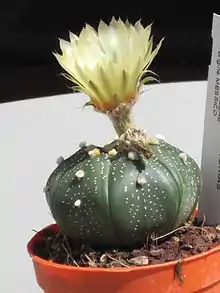
As with certain other slowly maturing cacti, A. asterias is listed as endangered by the United States Fish and Wildlife Service,[6] vulnerable on the International Union for Conservation of Nature's Red List,[1] and critically imperiled by The Nature Conservancy.[10] It is listed on Appendix I of the Convention on International Trade in Endangered Species of Wild Fauna and Flora (CITES),[13] meaning that commercial international trade in wild-collected specimens is prohibited.[13] Despite this protection, illegal collection continues to threaten the future of this species.[6] and its decline in the wild has been largely attributed to over-collection and poaching. It is sometimes accidentally harvested due to its similarity to the closely related and coexisting peyote (Lophophora williamsii).[14] Other contributing factors are thought to be urban development and herbicides. Habitat destruction has been, and remains, the major cause of the decline in this species; vast areas have been converted to agricultural use and road construction.[9] In Texas, mechanical and chemical bush clearing techniques together with the introduction of invasive grasses have had devastating effects.[9]
The United States Fish and Wildlife Service have drafted a Recovery Plan in an attempt to secure the future of this species.[9] The Recovery Plan highlights the need to protect existing populations, carry out research into possible new populations and to develop a formal conservation agreement between the United States and Mexico.[9]
References
This article incorporates text from the ARKive fact-file "Astrophytum asterias" under the Creative Commons Attribution-ShareAlike 3.0 Unported License and the GFDL.
- Hernández, H.M.; Smith, M.; Terry, M.; Fitz Maurice, W.A.; Fitz Maurice, B (2017). "Astrophytum asterias". IUCN Red List of Threatened Species. 2017: e.T40961A121438670. doi:10.2305/IUCN.UK.2017-3.RLTS.T40961A121438670.en. Retrieved 11 November 2021.
- "Appendices | CITES". cites.org. Retrieved 14 January 2022.
- "Astrophytum asterias". Germplasm Resources Information Network. Agricultural Research Service, United States Department of Agriculture. Retrieved 7 August 2010.
- Loflin, Brian; Shirley Loflin (2009). Texas Cacti. Texas A&M University Press. p. 207. ISBN 978-1-60344-108-7.
- Anderson, E.F., Arias Montes, S. & Taylor, N.P. (1994) Threatened Cacti of Mexico. Royal Botanic Gardens, Kew. - via ARKive
- "Star Cactus (Astrophytum asterias)". Wildlife Fact Sheets. Texas Parks and Wildlife Department. Archived from the original on 26 July 2010. Retrieved 7 August 2010.
- Blair, Andrew W.; Williamson, Paula S. (December 2008). "Effectiveness and Importance of Pollinators to the Star Cactus (Astrophytum asterias)". The Southwestern Naturalist. 53 (4): 423–430. doi:10.1894/JB-04.1. S2CID 85845544.
- IUCN Red List (February 2003)
- Star Cactus Draft Recovery Plan (February, 2003) https://web.archive.org/web/20030419193014/http://ifw2es.fws.gov/Documents/R2ES/DRAFT_FR_Star_Cactus_Recovery_Plan_10-17-02.pdf - via ARKive
- Astrophytum asterias. Archived 31 August 2005 at the Wayback Machine The Nature Conservancy.
- Arkive factsheet Archived 8 October 2012 at the Wayback Machine (citing personal communication with Dr Nigel Taylor, Royal Botanic Gardens, Kew).
- Wyman, Donald (1986). Wyman's Gardening Encyclopedia. Simon and Schuster. p. 96. ISBN 978-0-02-632070-2.
- CITES (February, 2003) www.cites.org - via ARKive
- Terry, M.; D. Price; J. Poole (2007). "A Tale of Two Cacti - The Complex Relationship between Peyote (Lophophora williamsii) and Endangered Star Cactus (Astrophytum asterias)" (PDF). Southwestern Rare and Endangered Plants: Proceedings of the Fourth Conference: 115–121.
External links
- star-cactus/astrophytum-asterias Astrophytum asterias media from ARKive
- (in French) Astrophytum asterias on Astroweb
- (in German) Astrophytum asterias on Astrobase
- (in English) photos on www.cactiguide.com
- (in French) photos on www.AIAPS.org
